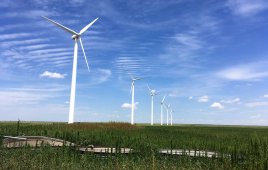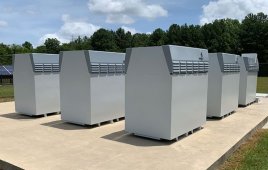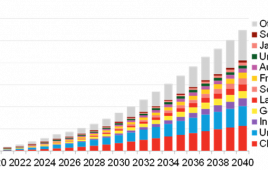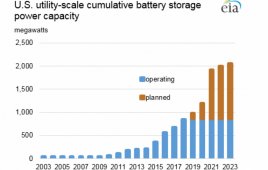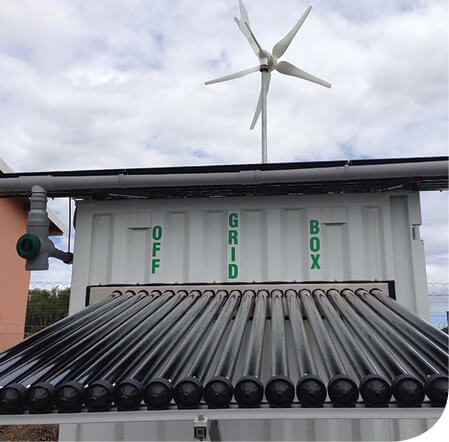
The solar panels also collect rainwater. OffGridBox says it is helping NGOs, schools, hospitals, businesses, and homeowners around the world produce clean power and water.
The developer of a clever rescue system called the OffGridBox, says it houses the equipment to produce potable water and provide power where none was before, or thanks to mother nature, once was. The developer originally conceived the box for less developed regions of the planet where there was no access to sustainable, reliable electricity and safe water.
The company, based in Italy, says that it takes only a few hours using a small crane and a pickup truck to deliver and start. What’s more, it also provides basic training to local maintenance operators — no matter their education level. It’s a great opportunity to empower women, they say, while providing the basics of life.
The Box empowers women several ways, says Bas Berens, VP European Partnerships for OffGridBox. “First of all, we will employ two to three women to manage each Box. That totals to 375 women for the 150 boxes we plan to install next year. They will be trained to operate the box, after which they can explain to rural communities how it all works, and do basic maintenance. They will be responsible for distributing the clean water and battery packs and for collecting money to pay for the services. The women will also receive a bonus when they expand the customer base, so they will learn some marketing and sales skills,” said Berends.
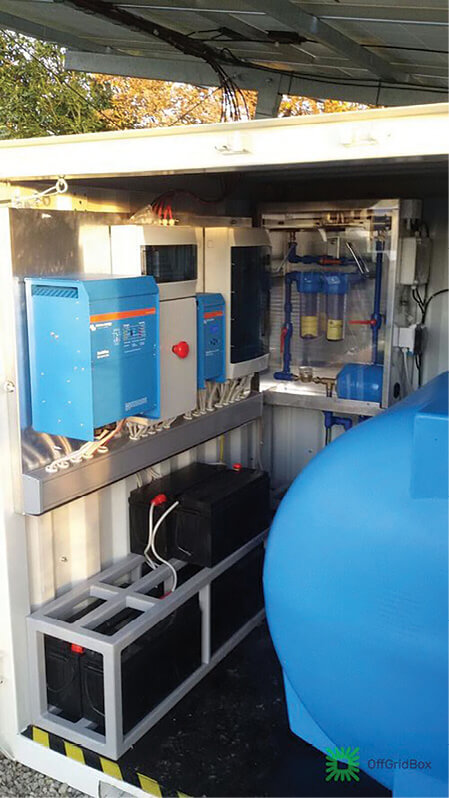
A peek inside the box shows controls, batteries, water purification equipment, and the blue, water-storage tank. The solar panels can be photovoltaic or concentrating power.
Secondary employment for women, he adds, may derive from the availability of electricity for use in barber shops, retail shops, and other small businesses that can stay open after dark. Watch the video here: https://goo.gl/No6eDh
“Apart from the positive effects for these specific women, we also believe the solar energy and clean water will bring huge benefits for all participating women: they will have healthier lives due to the purified water and absence of dirty kerosene fumes that once lit their homes at night. They will also have to spend less time collecting fuel for a fire to boil dirty water. Using electric light instead of kerosene lamps or candles also lets women cook more efficiently.”

The Box has already served in one disaster relief mission in the Philippines after a typhoon wiped out power, communication, and safe water.
Berends says a next step for the OffGridBox is to add connectivity as an extra service to customers through WiFi hotspots powered by the Box’s solar-generated electricity. This will help rural people connect, get information about prices for their produce, and possibilities for employment, and thereby empower themselves.
Power for the Box equipment will come from a small wind turbine and solar panels, and potable water comes from an onboard filtration system driven by pumps and batteries. The solar panels also collect rain which is funneled to an onboard tank.
The Box has already served in one disaster relief mission in the Philippines after a typhoon wiped out power, communication, and safe water. Like the southeast U.S., the only certainty was that the sun would rise in the morning and there would be water of poor quality. However, the OffGridBox sustained a small number of people with renewable power and sterilized water.
Filed Under: Community wind, Energy storage, Featured

